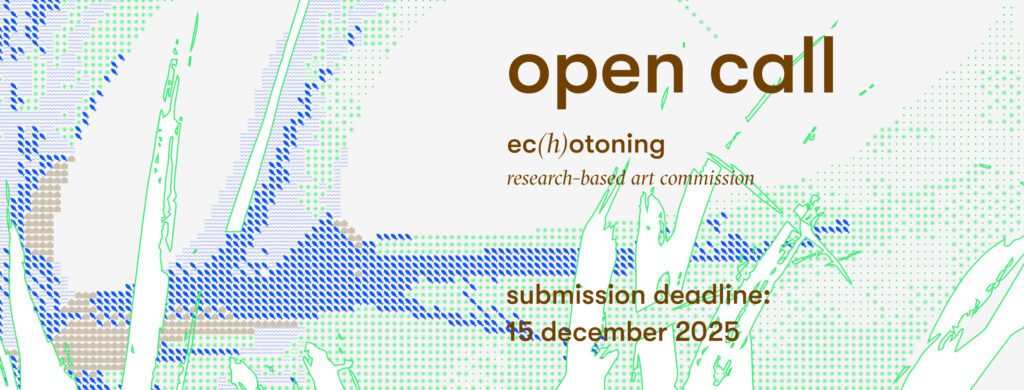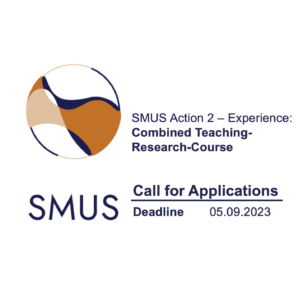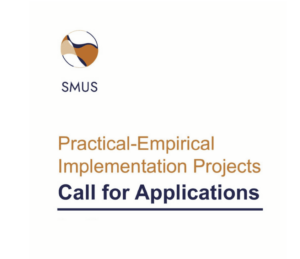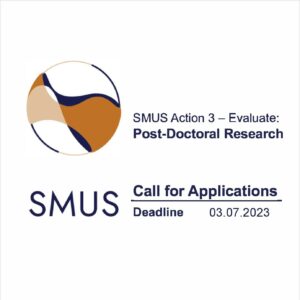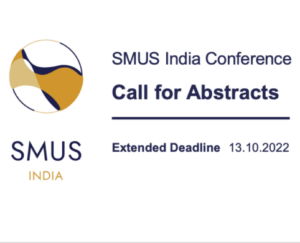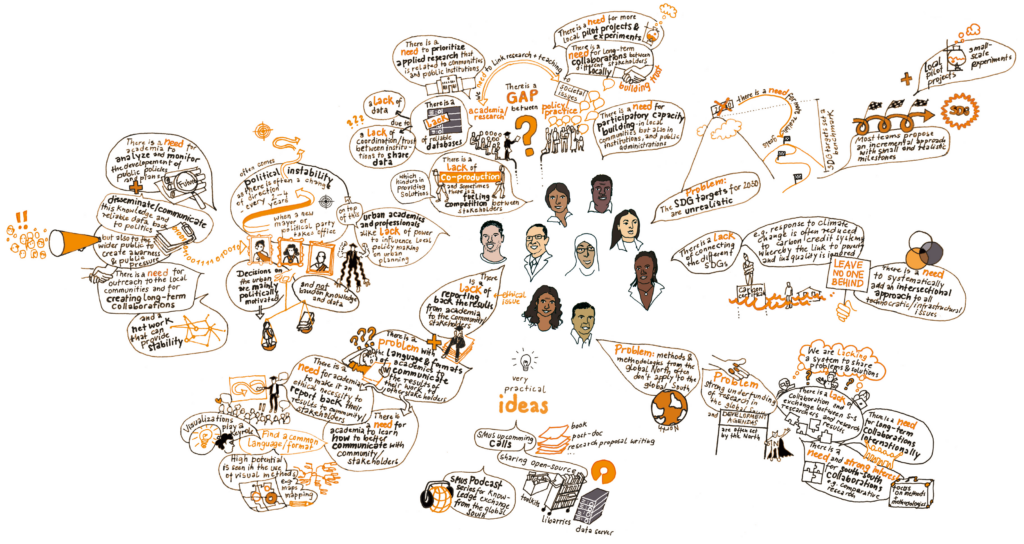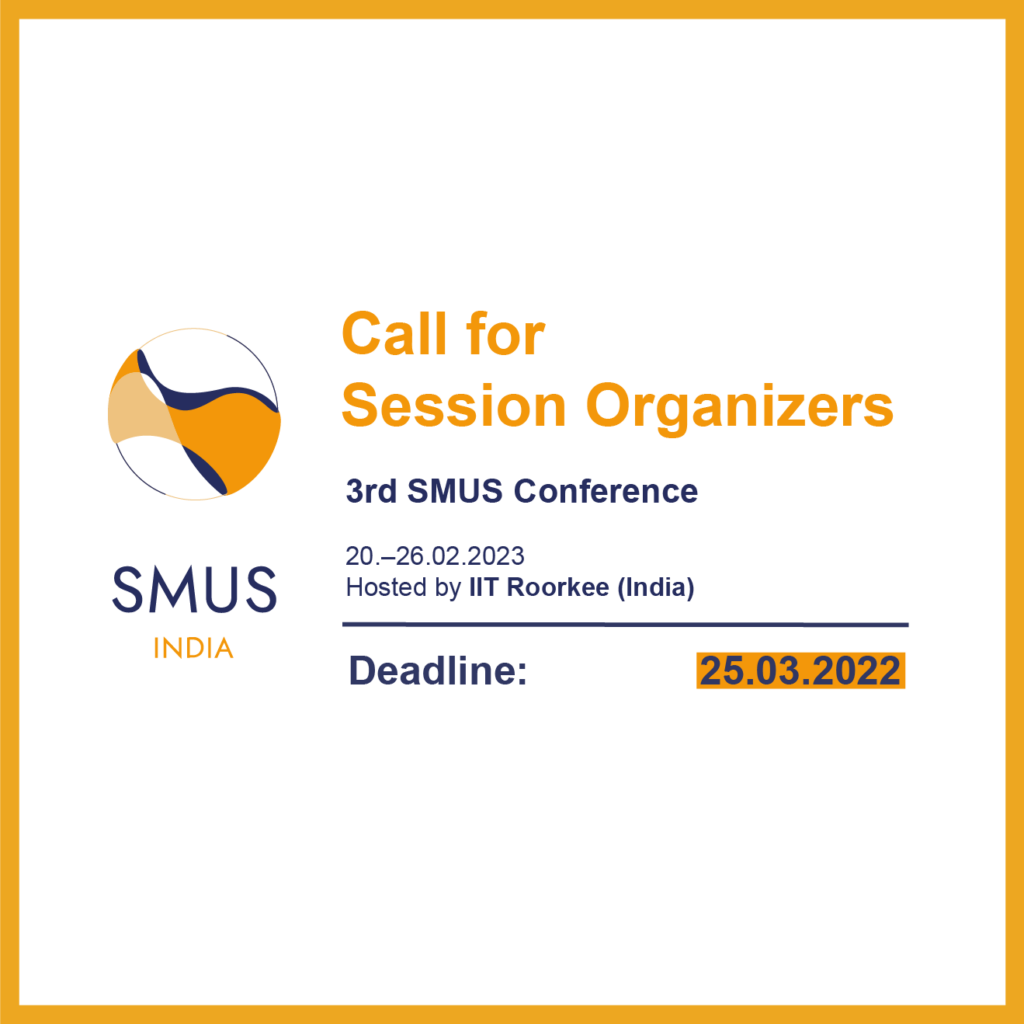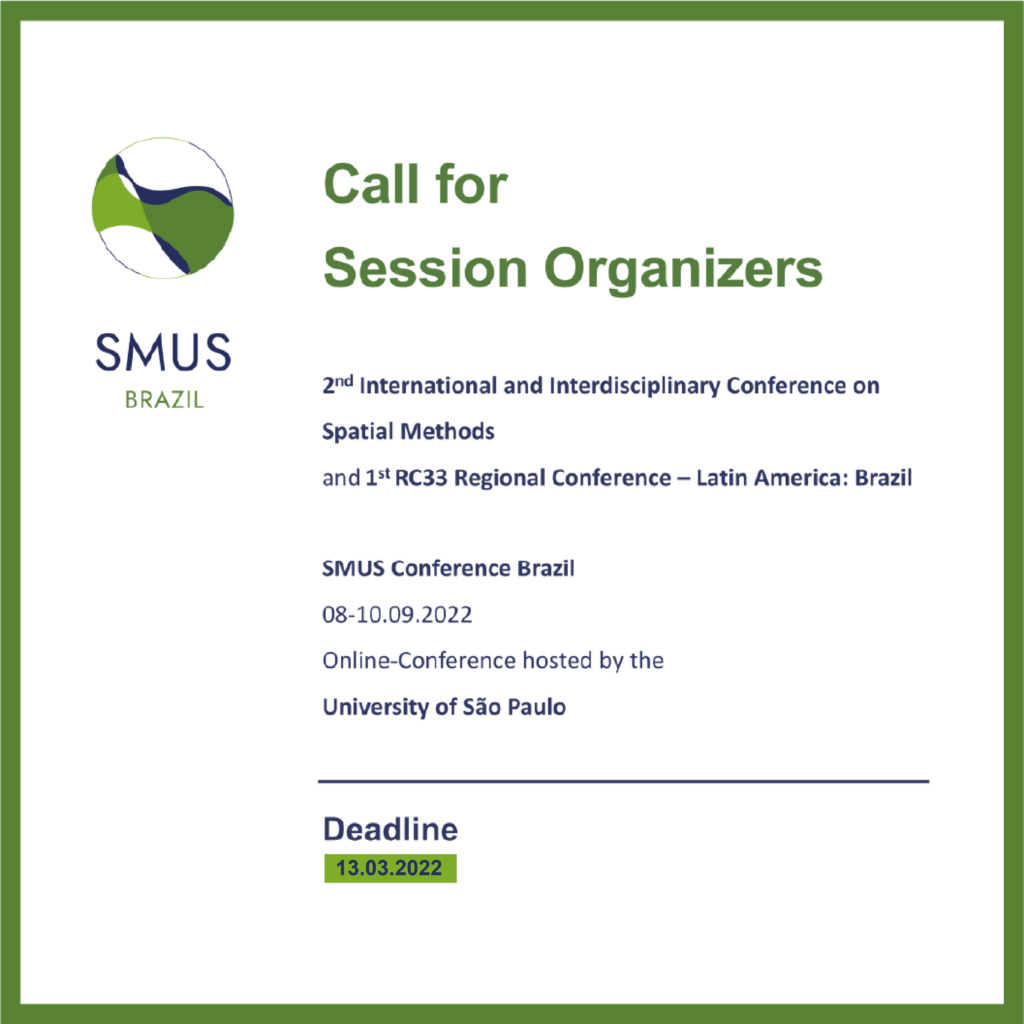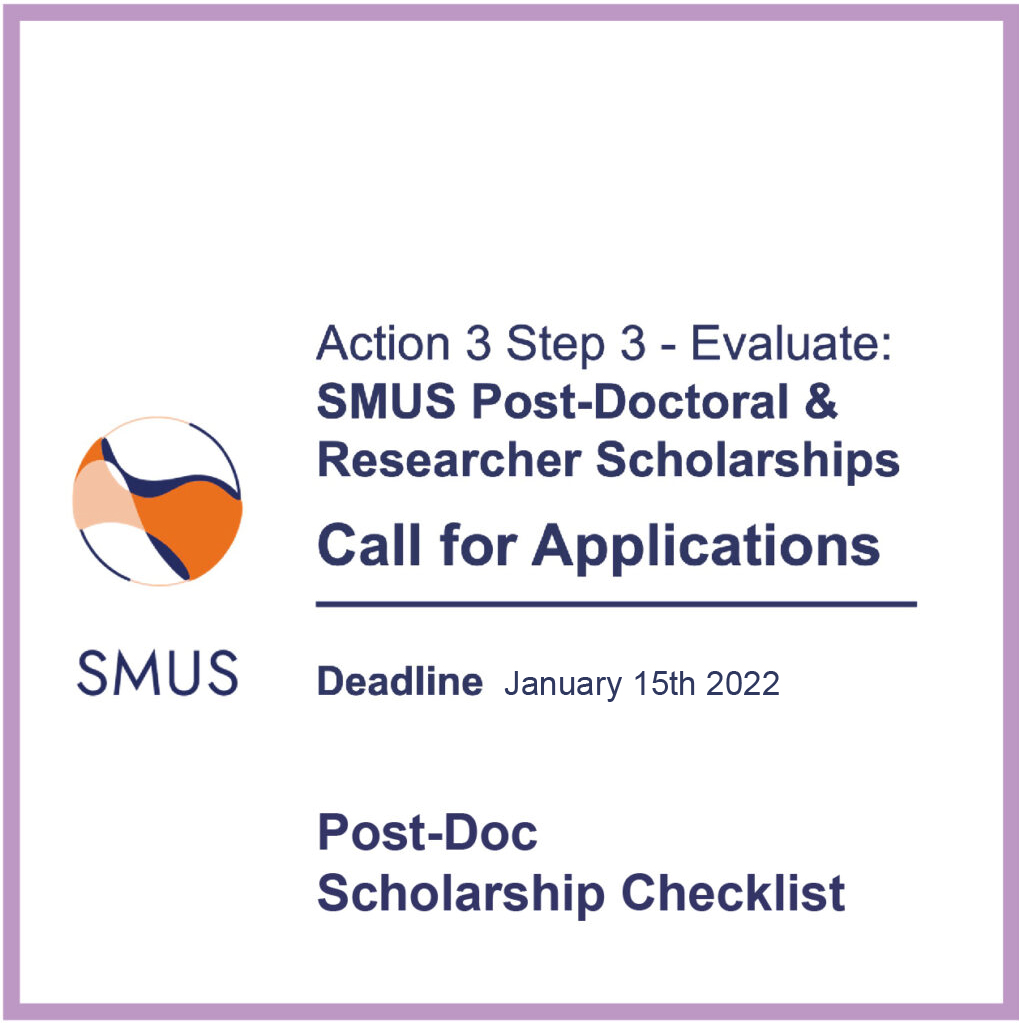Call for Abstracts (Extended Deadline: Friday, 15.08.2023)
4th International and Interdisciplinary Conference on Spatial Methods for Urban Sustainability (SMUS Conference) &4th RC33 Regional Conference Asia: Thailand, 23‒29.07.2024, hosted by Chulalongkorn University (Thailand)
We hereby invite you to submit an abstract for the “4th International and Interdisciplinary Conference on Spatial Methods for Urban Sustainability” (“SMUS Conference”), which will simultaneously be the “4th RC33 Regional Conference Asia: Thailand” and take place on site at the Faculty of Political Science, Chulalongkorn University (Bangkok, Thailand) from Tuesday, July 23rd, to Monday, July 29th, 2024.
About the Conference
The “Global Center of Spatial Methods for Urban Sustainability” (GCSMUS or SMUS) together with the Research Committee on “Logic and Methodology in Sociology” (RC33) of the “International Sociology Association” (ISA) and the Research Network “Quantitative Methods” (RN21) of the European Sociology Association” (ESA) will organize a 4th International and Interdisciplinary Conference on Spatial Methods for Urban Sustainability (“SMUS Conference”), which will simultaneously be the 4th RC33 Regional Conference Asia: Thailand, and take place on site at the Faculty of Political Science, Chulalongkorn University (Bangkok, Thailand) from Tuesday, July 23rd, to Monday, July 29th, 2024. The seven-day conference aims at continuing a global dialogue on methods and should attract methodologists from all over the world and all social and spatial sciences (e. g. anthropology, area studies, architecture, communication studies, computational sciences, digital humanities, educational sciences, geography, historical sciences, humanities, landscape planning, philosophy, psychology, sociology, urban design, urban planning, traffic planning and environmental planning). The conference programme will include keynotes, sessions and advanced methodological training courses. With this intention, we invite scholars of all social and spatial sciences and other scholars who are interested in methodological discussions to suggest an abstract to any sessions of the conference. All papers have to address a methodological problem.
Please find more information on the above institutions on the following websites:
If you are interested in getting further information on the conference and other GCSMUS activities, please subscribe to the SMUS newsletter by registering via the following website:
https://lists.tu-berlin.de/mailman/listinfo/mes-smusnews
Conference Sessions
-
-
- The Longue Durée in the 21st-Century Social Sciences: Methodological Challenges of Analyzing Long-Term Social Processes
- Methods for Analyzing the Economy: Rural-Urban-Relations, Spatial Transformations and the Economy
- Methodologies for the Investigation of Spatial Transformation Processes
- Cities and Communities: Unpacking the Contested Urban in South Asia
- Mapping the socio-spatial transformation of public space
- Decolonizing Social Science Methodology: Strategies for Challenging Power Structures and Promoting Equity in Research
- Towards Decolonial Reflexivity. A Dialogic Approach Towards Decolonizing Social Science Methodology
- The Decolonization of spatial ethnography: Perspectives and Limits
- Decolonizing social science methodology and the Global South – Methods from, by and/or for the Global South
- Beyond the Discourse: Dynamics, Intricacies and Challenges of Knowledge Decolonization in the Global South
- Decolonizing methodology of Social Science: from Post-colonial theory to Decolonial knowledge
- Overcoming methodological nationalism
- Decolonising the Canon for Methods Training
- Critical Mapping and comtemporary visual cultures
- Mapping as a tool for Participatory Methods in Spatial Research and Planning
- Exploring Spatial Micro Interactions and Videographic Methods
- Coping with iconic architecture in the Global South: Methodological dilemmas and opportunities
- Ethnography as Spatial-Temporal Method for Research on Urban Public Space
- Knowledge Cultures and Qualitative Methods
- Urban Ethnography – Practical Experiences, Lessons and Challenges of the Research Method
- (Re-)Thinking Methods for Migration Research
- Comparative Study about ‘Leaving’ and ‘Living’: Housing and Young People in Asia
- Urban Mobility Studies: Methodological Enquiry from Social Science and Human Centric Approaches
- Applying Spatial Methods in Homelessness Studies: Methodological and Ethical Challenges
- Decoding the City: Entanglements of the Material and Affective
- Urban Assemblage: Interrogating Transdisciplinary Methodological Approaches to Researching the City Environments
- Experimenting with Methods for Entangled Areas and Critical Zones
- Well-Being in Socio-Spatial – Participatory Research methods and tools
- Spatial Methods in Healthcare Research
- A Mixed Method Approach to The Prevention of Lifestyle Diseases in The Work Environment
- Global methods for the study of housing affordability and urban health?
- Between Precarity and Formality: Interrogating the Gendered Spaces of Informality in the Global South
- Feminist Participatory Methods for Gender-inclusive Urban Planning and Design
- Implementing Gender Sensitive Research Methods
- Methods in Food Studies Research
- Design Methods for Accessibility and Social Inclusion
- Methods in deviance research.
- Spaces of Violence_ Violent Spaces? Analyzing Forms of Violence and their Relation to Space
- Digitalization and Digital Transformation: Methodological Approaches, Dilemmas and Prospects
- Methods for studying religions and religious/sacred spaces
- Cross-cultural methods, transnational research and issues of comparability
- Language and Social Research
- Comparative urbanism and qualitative social research
- Diverse geographies, (dis)similar empirics: Exploring climate risks and resilience in urban deltas using ‘comparative urbanism’ approach
- Who and how should we include in methodological tools? Towards the integration of stakeholders and different approaches for spatial knowledge construction
- Spatial Methods in Transdisciplinarity for Urban Sustainability
- Teaching spatial methods and urban sustainability in different contexts
- Engendering Urban Governance and Planning in the Global South : Methodological Issues and Challenges
- Historical and contextual uses of planning and their methods
- Mixed Methods Use in Conservation Outcomes and Local Governance Assessment in Sustainable Forest Management
- Methodological Challenges, Overlaps, and Misunderstandings between Planning and the Social Sciences
- Sustainability and Resilience of Cities
- Mapping as a tool for Participatory Methods in Spatial Research and Planning
- Datafication of Asian Cities: Seeing the city with Algorithms
- Strategies of data collection, storage and access in psychology and related discipline
- Multi-Method Approaches in Interpretive Empirical Research on Relations between Established and Outsider Groupings
- Embracing Diversity in Empirical Research: Insights from culturally sensitive approaches
- Data-Driven Smart Community Design
- Understanding Influencers of Fast Urbanization using Non-survey Data
- Social Inequality in Field Work – Handling Reseachers’ Positionality in Research
- Current Trends of Research Ethics in Spatial Methods
- In the Field – Experiences in conducting research in the Global South
- How international is interpretive social research?
- Methodological Challenges in Spatial Method: A quantitative approach
- Key Ethical Principles in Protecting Research Subjects: Accommodating Research Ethics from Global South
Submission of Abstracts
If you are interested in presenting a paper in any SMUS Thailand 2024 session, please submit an English-language abstract containing the following information to SMUS Thailand via the official conference website https://gcsmus.org/conferences/thailand/ between 24.04.2023 and 15.08.2023.
-
- Mention the Session Number and Name
- Paper Title
- Speakers (= name(s), email address(es), institutional affiliation(s))
- 1000-2000 Word Abstract (= short description of the proposed talk. The abstract should explain which methodological problem is addressed, why this is relevant, how the paper refers to the session and what the general line of argument will be.)
- Only one submission per individual will be entertained.
Please note that all sessions must adhere to the rules of session organization comprised in the RC33 statutes and GCSMUS Objectives (see below). Please note that you can give a maximum of two papers at the conference, including joint papers. The conference organizers will inform you if your proposed paper has been accepted for presentation at the conference. For further information, please see the conference website or contact the session organizers.
Please also kindly forward this call to anybody to whom it might be of interest.
Jakkrit Sangkhamanee
Chulalongkorn University
SMUS 2024 Conference Convener

Rules for Session Organization
- There will be no conference fees.
- The session organizers and speakers will be expected to provide for their own funding for accommodation and travel expenses. However, members of SMUS partner institutions will be able to apply for a travel grant via their home institution. In addition, there will be travel grants for non-SMUS scholars from India who present a paper or organize a session. Travel grants will be high enough to fully cover travel costs and living expenses. Details on the application process will follow in autumn this year.
- The conference language is English. All papers therefore need to be presented in English.
- All sessions have to be international: Each session should have speakers from at least two countries (exceptions will need good reasons).
- Each paper must contain a methodological problem (any area, qualitative or quantitative).
- There will be several calls for abstracts via the SMUS, RC33 and RN21 Newsletters. To begin with, session organizers can prepare a call for abstracts on their own initiative, then at a different time, there will be a common call for abstracts, and session organizers can ask anybody to submit a paper.
- SMUS, RC33 and RN21 members may distribute these calls via other channels. SMUS members and session organizers are expected to actively advertise their session in their respective scientific communities.
- Speakers can only have one talk per session. This also applies for joint papers. It will not be possible for A and B to present at the same time one paper as B and A during the same session. This would just extend the time allocated to these speakers.
- Session organizers may present a paper in their own session.
- Sessions will have a length of 90 minutes with a maximum of 4 papers or a length of 120 minutes with a maximum of 6 papers. Session organizers can invite as many speakers as they like. The number of sessions depends on the number of papers submitted to each session: for example, if 12 good papers are submitted to a session, there will be two sessions with a length of 90 minutes each with 6 papers in each session.
- Papers may only be rejected for the conference if they do not present a methodological problem (as stated above), are not in English or are somehow considered by session organizers as not being appropriate or relevant for the conference. Session organizers may ask authors to revise and resubmit their paper so that it fits these requirements. If session organizers do not wish to consider a paper submitted to their session, they should inform the author and forward the paper to the local organizing team who will find a session where the paper fits for presentation.
- Papers directly addressed to the conference organising committee, suggesting a session. The conference organizers will check the formal rules and then offer the paper to the session organizer of the most appropriate session. The session organizers will have to decide on whether or not the paper can be included in their session(s). If the session organizers think that the paper does not fit into their session(s), the papers has to be sent back to the conference organizing committee as soon as possible so that the committee can offer the papers to another session organizer.
